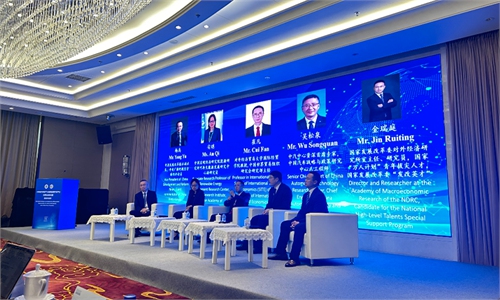
Illustration: Liu Xiangya/GT
Japan's top eight semiconductor makers including Sony Group and Mitsubishi Electric are planning to deploy around $30 billion in investments through 2029 in a fierce production race amid Japan's ambitious bid to become a leader in advanced chips for artificial intelligence (AI) and electric vehicles (EVs), Nikkei reported on Tuesday.Japan's increasing efforts to boost chip production to explore the opportunities in the expanding AI and EV markets will inevitably result in competition with rapidly advancing industries in China. However, the vast market potential and the mutually beneficial collaboration in the industrial chain between China and Japan indicate that the two countries can cultivate a positive "coopetition" relationship, despite the US pushing an anti-globalization agenda.
The rapid growth of the global EV industry and the shift toward electrification and smart technology in traditional fuel vehicles are undeniable trends. Countries like China and Japan are increasing their investments to take advantage of the lucrative market opportunities presented by these new dynamics. Industry experts predict that in the future, each fuel vehicle will be equipped with an average of 1,000 chips, while EVs will require over 2,000 chips.
It is crucial to recognize that amid this significant emerging market opportunity, China and Japan share not only a competitive relationship but also vast opportunities for cooperation and common interests. China and Japan have mutually beneficial industrial cooperation in key industries, particularly in innovative sectors such as EVs, semiconductors, and AI.
As China's massive vehicle market is expected to see approximately 30 million vehicles sales annually, Japanese car manufacturers are strategically pivoting toward electrification and intelligent technologies to strengthen their foothold in the competitive Chinese market.
By prioritizing the integration of advanced technologies like autonomous driving features, Japanese automakers, who have already seen success in the Chinese market, are aiming to maintain their lead in this rapidly expanding market.
China not only has a huge vehicle consumer market, but also a rapidly developing auto manufacturing industry, which can provide broad opportunities for industrial chain cooperation with Japan's automobile and semiconductor industries.
Although China's chip production capacity has been growing rapidly, the domestic supply rate of chips in the Chinese automotive manufacturing industry remains relatively low, leading to a large demand for imports. This undoubtedly presents a huge opportunity for Japanese industries that are currently increasing investment to expand production capacity.
However, for some time, under the influence of factors such as pressure from the US, Japan's economic and trade policies have also shown the "politicized" tendency. This shift has raised concerns among some observers about the potential impact on Japan's economy and its relationships with other countries. It remains to be seen how these developments will play out in the long term.
For instance, the Japanese Ministry of Economy, Trade and Industry on April 26 announced that four technology categories related to semiconductors and quantum will be included in export controls, according to the Nikkei. The move, widely considered as politicizing economic and trade issues, will only hinder the normal economic and trade cooperation between Japan and other countries.
It's no secret that the US' geopolitical calculation behind its coercion of Japan and other countries is attempting to push Tokyo to strangle the development of China's semiconductor industries. Yet, in the selfish geopolitical calculations of the US, the interests of Japanese companies and industries can be sacrificed.
Succumbing to US protectionism, anti-globalization sentiments, and attempts to contain Chinese chip and EV industries are a wrong path for Japan. It will only hurt the interests of Japanese companies. Hopefully, Japan's ambitious plan to lead in advanced chips for AI and EV sectors can avoid falling into the political trap set by the US.
The author is a reporter with the Global Times. bizopinion@globaltimes.com.cn



